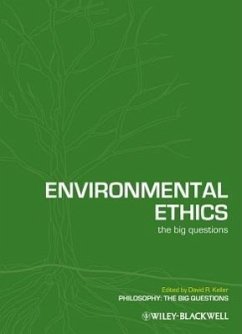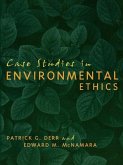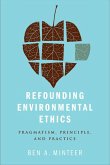Environmental ethics is a relatively new philosophical discipline that addresses the complex convergence of humans with the natural world and its nonhuman inhabitants. Environmental Ethics: The Big Questions presents a series of interdisciplinary readings that examine the moral dimensions of the delicate relationship between human beings and the environment. Carefully chosen selections drawn from philosophy, the social and life sciences, economics, history, legal studies, business, and literature are organized clearly around the history of anthropocentric (human-centered) and nonanthropocentric origins of environmental ethics. The readings serve as an investigation of the proper scope of moral considerations relating to the environment - one that includes humans, animals, living things, ecosystems, and the built environment. Other topics include political approaches to environmental ethics, the importance of ecological science, and contemporary public policy issues such as agriculture, sustainability, population, globalization, and injustice. Readers are also directed to an online archive of continually updated international case studies that serve to complement and explicate the theoretical discussions outlined in the text. Thought provoking and timely, Environmental Ethics: The Big Questions offers illuminating insights into an issue that is becoming more critical each year. To view a growing archive of environmental ethics case studies, please visit: http://environmentalethics.info/.
Hinweis: Dieser Artikel kann nur an eine deutsche Lieferadresse ausgeliefert werden.
Hinweis: Dieser Artikel kann nur an eine deutsche Lieferadresse ausgeliefert werden.
"Overall, Environmental Ethics: the big questions is anessential text for anyone looking to get to grips with key thinkersand their contributions to this new and burgeoning domain ofethics. Whilst challenging at times, the variety of papers in termsof both inter-disciplinary and difficulty is wide, allowing readersto effectively engage irrespective of background. Further, thelayout is clear and general binding and page quality high to ensurethis can remain an indispensable reference text for thefuture." (The Guardian, 26 November 2013)
Featured in TheGuardian - 26 November 2013
"Overall, Environmental Ethics: the big questionsis anessential text for anyone looking to get to grips with key thinkersand their contributions to this new and burgeoning domain ofethics. Whilst challenging at times, the variety of papers in termsof both inter-disciplinary and difficulty is wide, allowing readersto effectively engage irrespective of background. Further, thelayout is clear and general binding and page quality high to ensurethis can remain an indispensable reference text for many years tocome." (Economics & Philosophy, 1November 2013)"The major strength of the book is the fact that it evolved from aclassroom course on environmental ethics. The different texts areselected, put together and introduced by an experienced teacher. Assuch, the selection of text has already proven successful andinstructive. The editor has put an enormous amount of effort intoselecting the right texts, which took him, according to thepreface, over four years." (Ethical Perspectives, 2011)
"Environmental ethics emerged in the mid-1970s and has beenexponentially growing in volume and scope ever since. As a newcentury and a new millennium dawn, environmental ethics is thephilosophy of the future, looking outward to partner with socialand life sciences, history, law, business, and literature toprovide synthesis instead of the finer and finer analysis of arcane"puzzles" that characterized the inward-looking philosophy of theprevious century.
In the new spirit of the new philosophy of the new century, thisnew textbook provides a synoptic overview of the field. Thepioneers, living and dead, are all represented along with theemerging voices of the present. Unique to this volume is commentaryby the leading lights in the field about why environmental ethicsis a worthwhile study. That section, along with Keller's historicaland thematic overview of the field, the best yet in any textbook,is worth the price of admission to the book."
--J Baird Callicott, Regents Professor of Philosophy,Chair, Department of Philosophy and Religion Studies, University ofNorth of Texas
Featured in TheGuardian - 26 November 2013
"Overall, Environmental Ethics: the big questionsis anessential text for anyone looking to get to grips with key thinkersand their contributions to this new and burgeoning domain ofethics. Whilst challenging at times, the variety of papers in termsof both inter-disciplinary and difficulty is wide, allowing readersto effectively engage irrespective of background. Further, thelayout is clear and general binding and page quality high to ensurethis can remain an indispensable reference text for many years tocome." (Economics & Philosophy, 1November 2013)"The major strength of the book is the fact that it evolved from aclassroom course on environmental ethics. The different texts areselected, put together and introduced by an experienced teacher. Assuch, the selection of text has already proven successful andinstructive. The editor has put an enormous amount of effort intoselecting the right texts, which took him, according to thepreface, over four years." (Ethical Perspectives, 2011)
"Environmental ethics emerged in the mid-1970s and has beenexponentially growing in volume and scope ever since. As a newcentury and a new millennium dawn, environmental ethics is thephilosophy of the future, looking outward to partner with socialand life sciences, history, law, business, and literature toprovide synthesis instead of the finer and finer analysis of arcane"puzzles" that characterized the inward-looking philosophy of theprevious century.
In the new spirit of the new philosophy of the new century, thisnew textbook provides a synoptic overview of the field. Thepioneers, living and dead, are all represented along with theemerging voices of the present. Unique to this volume is commentaryby the leading lights in the field about why environmental ethicsis a worthwhile study. That section, along with Keller's historicaland thematic overview of the field, the best yet in any textbook,is worth the price of admission to the book."
--J Baird Callicott, Regents Professor of Philosophy,Chair, Department of Philosophy and Religion Studies, University ofNorth of Texas








